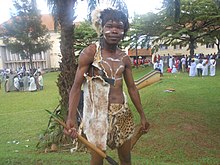Agwara is a royal dance of the Alur people of Northern Uganda, performed in the presence of the king (Rwot).[1] It is performed by both women and men during social occasions. The dance is performed to drums, and uses linear and circular formations characterized by leg and waist twisting while wearing ankle bells to emphasize their footwork.[2][3][4]



Performance
editIn the past, Agwara was performed at rituals organized by communities in order to worship or appease the gods, in order to ask for a good harvest before sowing, at the occasion of midsummer or midwinter festival, or just on the occasion of entering a new lunar phase or if there was need of rain. Additionally, there are two types of agwara, "Kwaya" or "Mbaka" which are danced for two days especially for clan competitions and "Selewa" which is ordinarily for thanksgiving.[5][6]
See also
editReferences
edit- ^ "Rwot Ubimi urges subjects on developing kingdom". New Vision. Retrieved 2024-01-27.
- ^ Oneka, Dennis (2011-05-06). "Agwara dance".
{{cite journal}}: Cite journal requires|journal=(help) - ^ "Cultural Dances in Uganda". Waka Natures. Retrieved 2024-01-27.
- ^ "Alur". 101 Last Tribes. Retrieved 2024-01-27.
- ^ "Celebrating the wealth of ethnicity". Monitor. 2021-01-05. Retrieved 2024-01-27.
- ^ "Background on the Music of Northern Uganda". Singing Wells. 2012-10-29. Retrieved 2024-01-27.